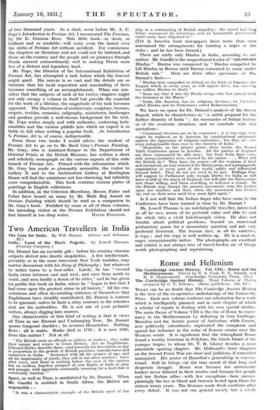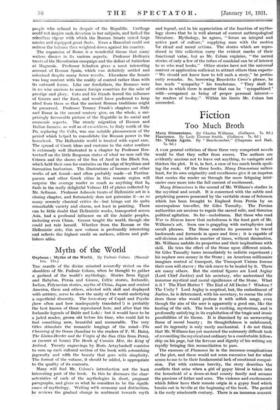Rome and Hellenism
The Cambridge Ancient History. Vol. VIII.—Rome and the Mediterranean. Edited by S. A. Cook, F. E. Adcock, and M. P. Charlesworth. (Cambridge University Press. 35s.) TIIERE can be no doubt that The Cambridge Ancient History
is the best of the co-operative undertakings of the University Press. Each new volume confirms our admiration for a work which is intelligently planned, and in each chapter of which a scholar of repute is dealing with his own special studies. The main theme of Volume VIII is the rise of Rome to supre- macy in the Mediterranean by defeating in turn Carthage, Macedon and the Asiatic power of Antiochus, while Greece, now politically subordinate, captivated the conqueror and spread her influence in the wake of Roman armies over the Western world. It is significant that the triumphant Rome found a worthy historian in Polybius, the Greek friend of the younger Scipio, to whom Dr. T. R. Glover devotes a most admirable opening chapter. Mr. Hallward's three chapters on the Second Punic War are clear and judicious, if somewhat uninspired. His praise of Hannibal's generalship is conven- tional. Still he brings cut the true moral of that long and
desperate struggle. Rome won because her aristocratic leaders never faltered in their resolve and because her people
and her Italian allies—with few exceptions—bore uncom- plainingly the tax in blood and treasure levied upon them for sixteen weary years. The Romans made fresh exertions after every defeat. It was not one general merely but a whole people who refused to despair of the Republic. Carthage could net inspire such devotion in her subjects, and lacked the relentless vigour with which the Roman Senate raised large armies and equipped great fleets. Even a Hannibal could not redress the balance thus weighted down against his country.
The expansion of Rome is a wonderful theme that many writers discuss in its various aspects. Professor Holleaux treats of the Macedonian campaign and the defeat of Antiochus at Magnesia. Professor Schulten gives a most interesting account of Roman Spain, which was definitely settled and colonized despite many fierce revolts. Elsewhere the Senate was long content with the reality of control rather than with its outward forms. Like our forefathers, the Romans were in no wise anxious to annex foreign countries for the sake of prestige and glory. Cato and his friends feared the influence of Greece and the East, and would have preferred to keep aloof from them so that the ancient Roman traditions might be preserved. Professor Tenney Frank's chapters on Italy and Rome in the second century give, on the whole, a sur- prisingly favourable picture of the Republic in its social and economic aspects. The steady migration of Roman and Italian farmers, as well as of ex-soldiers, to Italy north of the Po, replacing the Celts, was one notable phenomenon of the period which helped to consolidate the Roman power in the homeland. The Hellenistic world is treated with equal care. The spread of Greek ideas and customs to the outer confines is extremely well illustrated in a chapter by Professor Ros- tovtzeff on the little Bosporan states of what we now call the Crimea and the shores of the Sea of Azof in the Black Sea, which held their own for centuries on the edge of Scythian and Sarmatian barbarism. The illustrations of bronzes and other works of art found—and often probably made—at Pantica- paeum and other Greek cities in this remote region will surprise the average reader as much as anything that he finds in the really delightful Volume III of plates collected by Mr. Seltman. Professor Ashmole treats of Hellenistic art in a closing chapter, and fortunately does not patronize it—as so many severely classical critics do—but brings out its quite remarkable variety and charm, not least in painting. There can be little doubt that Hellenistic works, transported across Asia, had a profound influence on all the Asiatic peoples, including even China. Greece taught the world, though she could not rule herself. Whether from the Roman or the Hellenistic side, this new volume is profoundly interesting: and reflects the highest credit on authors, editors and pub- lishers alike.



































 Previous page
Previous page